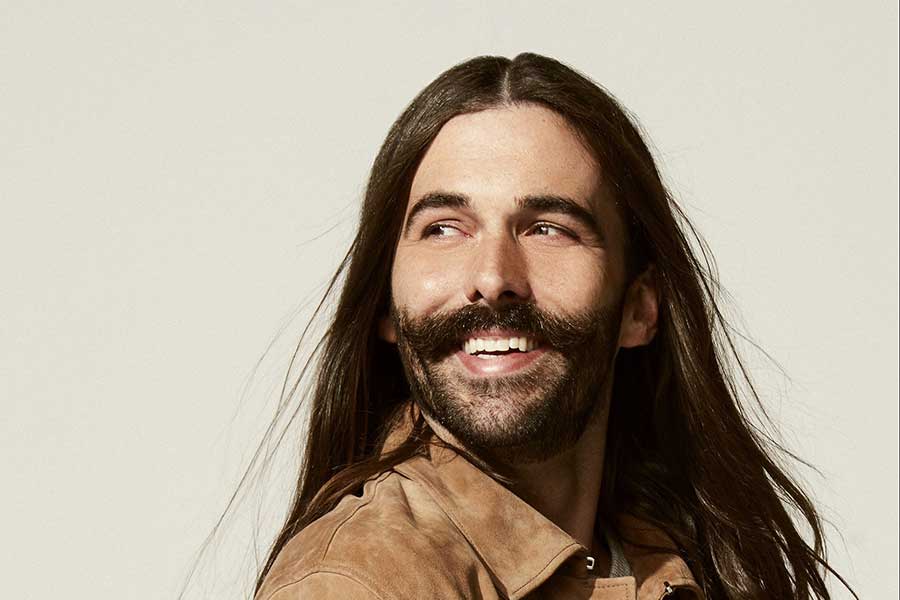To most audiences, LGBTQ or otherwise, long-haired Jonathan Van Ness is an out, style/social-consciousness icon whose talents as a hairdresser and tonsorial-grooming expert on the Netflix series “Queer Eye” — the surprisingly poignant reboot of the Bravo network’s “Queer Eye for the Straight Guy” — are only surpassed by his instincts regarding magnanimity and public spirit.
Perhaps it is that very same intuition that makes him a dynamic podcaster (à la “Getting Curious with Jonathan Van Ness”) and universally loved stand-up comedian who came for his first comedy gig in Philadelphia at Upper Darby’s Tower Theatre on Thursday, Feb. 28.
PGN caught up to the constantly in motion Van Ness fresh from a stay in Japan, where he and the “Queer Eye” crew were filming special episodes.
PGN: As a stand-up comedian, are you as excited to twist the language in comical spurts as zealously as you do on “Queer Eye” or your podcast?
JV: I always want to be aware of the impact that my comedy makes. I always try to use my best judgment. To me, comedy is to bring people joy and to make them laugh. It’s not to shock people. I just want to bring joy and laughter and knowledge in fun ways.
PGN: I ask because you seem truly and honestly very emotional on “Queer Eye,” and dedicated to those you come in contact with. Are there episodes of the program that you can point to that are the most touching?
JV: I’ve been behind a chair doing hair for 13 years, so connecting with people I work with comes naturally to me. Picking someone as my favorite is hard, but Mamma Tammye [Tammye Hicks, the show’s first female client and a devoutly religious woman who stole the show when the “Queer Eye” crew rehabbed her church and her home] is definitely so special. But there are also moments coming up in season three that are equally touching in new ways.
PGN: I have interviewed a lot of podcast people — some who do comedy (Greg Proops comes to mind) who keep their stand-up work and podcast work separate. Does one influence the other?
JV: They are very different to me. In “Getting Curious,” I’m interviewing a new person every week about things I’m curious about, so I’m not really doing standup. I’m asking questions in earnest and having a fun conversation. I might be funny sometimes, but that’s not what inspires the podcast.
PGN: Self-assurance is the one thing that seemingly carries through everything you do. Where did that come from in your past?
JV: From running away from pitchforks my whole childhood.
PGN: Were you a big fan of the original “Queer Eye,” and was there someone on that show that you felt most attracted to as an influencer/guide/teacher?
JV: I was most attracted in general to Kyan [Douglas] — he was totally my first crush. But I look up to all of the Fab Five in different ways, and they are all people whose opinions and friendships I appreciate.
PGN: The “Gay of Thrones” show (a “Funny or Die” online short program) is illuminating and hilarious. Were you much of a “Game of Thrones” fan before doing “Gay of Thrones” on your podcast?
JV: At first my temperature was like 99.1, but now it’s like 106-degree fever.
PGN: I have interviewed several “Game of Thrones” actors who think “Gay of Thrones” is fantastic. Do you have much interaction with the cast? And how do you think “Game of Thrones” will end?
JV: I got to work with them for a season premiere in 2014, and they were all really nice. And I have no clue as to how “Thrones” will end. I really don’t have a clue, but I can’t wait to see what happens.
PGN: This standup show … from what I am hearing, your fan base is as much of a female crowd as an LGBTQ crowd. Is it teens? And how do you speak separately and equally to both?
JV: Actually, my fan base is not teen girls; it’s actually more women in their 20s and 30s and above. I have fans of all ages from different walks of life. I give observations on my experiences and try to be an ally, period. That’s how I speak equally.
PGN: What is your biggest responsibility on that standup stage? Is it solely to you? Is it to an LGBTQ community?
JV: The biggest responsibility is to the people who bought tickets to my show. I want to give them an hour and some break from this crazy world we’re in and bring them some joy and levity.

